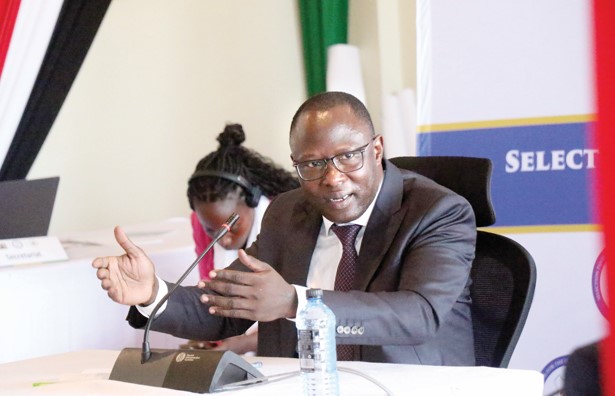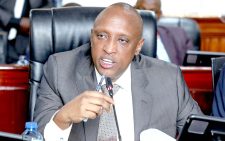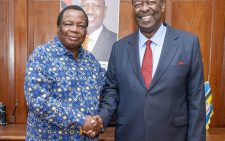Kalonzo rejects nomination of Ethekon, IEBC members

President William Ruto has opened a can of worms after he nominated former Turkana attorney Erastus Ethekon as chairman of the Independent Electoral and Boundaries Commission (IEBC).
Immediately after the president released the names of the chairman and members of the electoral commission, Wiper party leader Kalonzo Musyoka dismissed the nominations, saying Ruto’s action had created a low-trust institution.
Kalonzo’s sentiments could be a pointer to possible court cases challenging the appointment of the IEBC officials in the coming days, considering the emergence of claims that Ethekon was not the leading candidate in the interviews.
“We are extremely concerned that Ruto chose to be partisan by ignoring the Principle of Consultation and Concurrence in his recommendations of the chairman and members of the Independent Electoral and Boundaries Commission (IEBC),” Kalonzo said on his social media accounts
He added: “As we had stated in prior correspondence on the subject, it is now evident that the intention is to rig not only the next election but also the upcoming by-elections. A comprehensive statement will be released by the Opposition on Monday, May 12, 2025.”
Completing tasks
After Ruto released the names of nominees focus shifts to the Justice and Legal Committee (JLAC) of the National Assembly to commence the approval hearing.
Ruto directed the National Assembly which is currently in recess to prioritise the approval hearing for the nominees so that IEBC can be functional once again.
“In recognition of the indispensable role of the IEBC as one of the cornerstone institutions of our democracy and custodian of electoral management, … the President has urged the National Assembly to prioritise the consideration of these nominations,” a statement from Head of Public Service Felix Koskei read in part.
As with other legislative processes, the National Assembly will be required to ensure public participation by advertising the date when vetting will start so that concerned Kenyans can submit memoranda and petitions of the nominees to JLAC.
Former Registrar of Political Parties Anne Ndiritu, Moses Alutalala Mukhwana, former Jubilee Party Executive Director Mary Karen Chesang Kigen, former Education and Sports Chief Administrative Secretary (CAS) Hassan Noor Hassan, former Technical University of Kenya (TUK) Vice-Chancellor Francis Aduol, and Lamu County Assembly Service Board Fahima Araphat Abdallah were nominated as members.
Notably, from the six candidates whose names were added to the interviewees’ list after the Selection Panel had concluded the shortlisting, only Noor was nominated by the president.
The other candidates included Kipyegon Mutai, Michael Ben Oliewo, Jibril Maalim Mohammed, Charles Stephen Kibet Ngeno, and Joel Mwita Daniel.
Selection Panel chairman Nelson Makanda denied sneaking in the six candidates, clarifying that his team had also published the names.
A court case filed by Kalonzo’s ally Koki Muli delayed the appointment of members of the IEBC Selection Panel.
Muli, the National Liberal Party leader, had in September filed a court case challenging the ruling of the Political Parties Disputes Tribunal that had declared him as the legitimate representative of small parties on the IEBC selection panel.
Signs that Kalonzo, who has since joined forces with former Deputy President Rigathi Gachagua and former Interior Cabinet Secretary Fred Matiang’i, was discontented with the selection process were evident this week in a letter to Ruto.
He and his Democratic Action Party- Kenya (DAP-K) counterpart Eugene Wamalwa insisted that Ruto must adhere to the recommendations of the National Dialogue Committee (Nadco) that call for concurrence between ruling and opposition coalitions before he nominates IEBC commissioners.
“Any process that sidelines the opposition, or is limited to Kenya Kwanza Alliance and Orange Democratic Movement, will create a partisan IEBC and undermine public trust,” Kalonzo stated.
Similarly, Centre For Multiparty Democracy (CMD) had called for transparency in the nomination of IEBC commissioners after the names were submitted to the President by the Selection Panel.
CMD pointed out that although the law mandates the Selection Panel to submit two names for chairperson and nine for commissioners, from which the president nominates one chair and six commissioners for parliamentary vetting, it does not prohibit the sharing of further details.
Completing tasks
“We believe that publicly sharing the candidates’ performance and ranking would go a long way in demonstrating the openness, fairness, and credibility of the process. This small but powerful act can strengthen public trust in an institution that is central to our democracy,” Muli said.
Kenyans have been highly awaiting the reconstitution of the electoral agency that has been without commissioners since 2023 after the exit of former chairman Wafula Chebukati following the expiry of their term.
Consequently, at IEBC there has been a pile up of duties that require policy formulation, a preserve of the commissioners.
Reconstitution of IEBC should have started six months before Chebukati’s team left office, putting the country at a risk of a constitutional crisis.
Apart from several pending by-elections, the deadline for delimitation of boundaries ran out in March last year.
The country risks going to the 2027 elections with an unprepared commission, should the opposition head to court over the nominations.
Experts in electoral matters have argued that the late appointment of commissioners will put unnecessary pressure on the commission, giving room for errors.
Time is running out for the procurement of the electoral system and material, with the opposition raising concerns that it will affect the efficiency of conducting a credible election.












